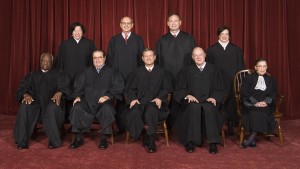June 25, 2013 | Posted By: Sean Estes
 Amid a series of high-profile and highly anticipated decisions this week, the Supreme Court made a relatively minor decision with potentially far-reaching consequences for the False Claims Act on June 24, 2013. The highest court in the United States denied a petition for certiorari in a case called Allison Engine Company v. United States ex rel. Sanders. The decision, commonly called “denying cert,” means that the Supreme Court decided not to hear an appeal of a Sixth Circuit opinion in the case. The question before the Court was whether Section 3729(a)(1)(B) of the False Claims Act applies retroactively to cases pending on or after June 7, 2008, where allegedly no false claims for payment were pending on or after that date.
Amid a series of high-profile and highly anticipated decisions this week, the Supreme Court made a relatively minor decision with potentially far-reaching consequences for the False Claims Act on June 24, 2013. The highest court in the United States denied a petition for certiorari in a case called Allison Engine Company v. United States ex rel. Sanders. The decision, commonly called “denying cert,” means that the Supreme Court decided not to hear an appeal of a Sixth Circuit opinion in the case. The question before the Court was whether Section 3729(a)(1)(B) of the False Claims Act applies retroactively to cases pending on or after June 7, 2008, where allegedly no false claims for payment were pending on or after that date.
The history behind the Allison Engine case is long and complex and has often focused on procedural, rather than factual, issues in the case. Two major events are the most relevant to the current discussion. In 2008, the case was before the Supreme Court for an interpretation of Section 3729(a)(2) of the False Claims Act. The Court found that the language of the statute required that a plaintiff had to prove that a defendant made or used a false statement with the purpose of getting a false claim paid by the government. The following year, Congress amended that section of the False Claims Act to essentially overrule the Court’s decision. Congress’s 2009 amendments relaxed the language of the renumbered Section 3729(a)(1)(B) and also included language that the amended provisions “apply to all claims under the False Claims Act…that are pending on or after” June 7, 2008.
This language gave rise to multiple conflicting decisions about what Congress meant by the term “claims.” Several circuits, including the Ninth and Eleventh Circuits, have found that Congress intended this to mean that the amended statute applies when there are actual pending claims for payment. Other circuits, such as the Second and Seventh Circuits, found that Congress meant that the amended language applies when there is a pending case, or essentially claims for relief under the False Claims Act. The Sixth Circuit in Allison Engine sided with the latter.
The Supreme Court has decided not to hear an appeal of the Sixth Circuit’s case, which would have given the Court the opportunity to essentially smooth out the growing divide in circuits and decide which circuit courts are correct. It is critical not to read too much into the Supreme Court’s decision; the Court hears a very small amount of cases that are requested of it every year. Thus, it is not fair to say that the Supreme Court is necessarily approving the Sixth Circuit’s position in the Allison Engine case. It may be that the Court is waiting for more circuits to weigh in, that it is not ready to reach an opinion on either side, or various other reasons for denying cert.
Without guidance from the Supreme Court, each circuit’s ruling stands as the law in that court. Thus, it remains critical for each relator’s counsel to carefully evaluate the holding in the circuit where the case will be filed. Any potential relator should discuss the specific factual circumstances of their case with their attorney prior to filing to ensure the case is brought in the proper circuit with most favorable law for that case.
If you believe you have information regarding fraud against the government and are considering bringing a False Claims Act case, please contact James Hoyer for an evaluation of your claims. Click here for more information about the firm and to submit your information electronically, or you may contact our office at 813-397-2300.

